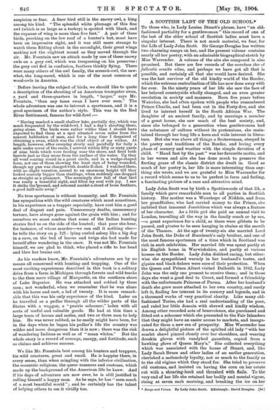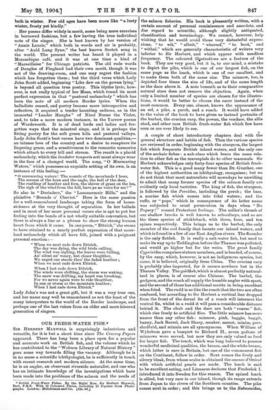To those who, in Lady Louisa Stuart's phrase, have "an
old- fashioned partiality for a gentlewoman" this record of one of the last of the elder school of Scottish ladies must have a singular interest. There is not much material, we fear, for the Life of Lady John Scott. Sir George Douglas has written two charming essays on her, and the present volume contains nearly all her poetry, with an admirable biographical sketch by Miss Warrender. A volume of the airs she composed is also promised. But there are few records of the seeretum iter et fallentis semita vitae, and perhaps we have got all that is possible, and certainly all that she would have desired. She was the last survivor of the old kindly world of the Border, which the extreme centralisation of life has now done away with for ever. In the ninety years of her life she saw the face of her beloved countryside wholly changed, and an even greater revolution in society and manners. Born five years before Waterloo, she had often spoken with people who remembered Prince Charlie, and had been out in the Forty-five, and she lived to interest herself in the South African War. The daughter of an ancient family, and by marriage a member of a great house, she saw much of the best society, and, since she belonged to a generation when gentlewomen had the substance of culture without its pretensions, she main- tained through her long life a keen and wide interest in litera- ture. But she was above all things a Scotswoman, steeped in the poetry and traditions of the Border, and loving every phase of scenery and weather with the simple devotion of a child. "Hand fast by the past" was her favourite motto, and in her verses and airs she has done much to preserve the fleeting grace of the classic district she dwelt in. Good as much of her poetry is, her life is more interesting than any- thing she wrote, and we are grateful to Miss Warrender for a record which seems to us to be perfect in form and feeling, a fascinating picture of a rare and attractive mind.
Lady John Scott was by birth a Spottiswoode of that Ilk, a family which gave remarkable men to all parties in Scottish history. Her mother was a Wauchope of Niddrie, and from her grandfather, who had carried money to the Prince, she imbibed that innocent Jacobitism which was always a feature of her character. As a little girl she paid an annual visit to London, travelling all the way in the family coach or by sea, —a great experience for a child, as there were gibbets to be passed, and pirates to be seen hanging in chains at the mouth of the Thames. At the age of twenty-six she married Lord John Scott, the Duke of Buccleuch's only brother, and one of the most famous sportsmen of a time which in Scotland was rich in such celebrities. Her married life was spent partly at his English home in Warwickshire, and partly at various houses on the Border. Lady John disliked racing, but other- wise she sympathised warmly in her husband's tastes, and gipsies and black-fishers were sure of their protection. When the Queen and Prince Albert visited Dalkeith in 1842, Lady John VMS the only one present to receive them; and in those days she went a good deal to Court, and formed a friendship with the unfortunate Princess of Parma.. After her husband's death she grew more attached to her own country, and rarely left it, finding her interest in its scenery and legends, and in a thousand works of very practical charity. Like many old- fashioned Tories, she had a real understanding of the poor, and ruled her little domain with shrewd and kindly wisdom. Among other recorded acts of benevolence, she purchased and fitted out a schooner which she presented to the Fair Islanders that they might have an easier access to markets, and inaugu- rated for them a new era of prosperity. Miss Warrender has drawn a delightful picture of the spirited old lady "with her scarlet shawl pinned closely over her shoulders, and wearing doeskin gloves with vandyked gauntlets, copied from a hawking glove of Queen Mary's." She collected everything which was associated with the house of Stuart, and, like Lady Sarah Bruce and other ladies of an earlier generation, cherished a melancholy loyalty, not so much to the family as to the old regime which they stood for. She tried to preserve old customs, and insisted on having the corn on her estate cut with a shearing-hook and threshed with flails. To the
very end of her life she retained her bodily and mental vigour, rising at seven each morning, and breaking the ice on her
• Songs and Verses. By Lady John Scott. Edinburgh; David Douglas. [58:1
. Her poems differ widely in merit, some being mere exercises in borrowed fashions, but a few having the true individual note of the singer. She is best known by her version of "Annie Laurie," which both in words and air is probably, after "Auld Lang Syne," the best known Scotch song in the world. The present writer has heard it played in a Mozambique cafe, and it was at one time a kind of " Marseillaise " for Chicago patriots. The old rude words of Douglas of Fingland had their own merit, though it was not of the drawing-room, and one may regret the fashion which has forgotten them ; but the third verse which Lady John Scott added, beginning "Like dew on the gowan lying,"
is beyond all question true poetry. This blythe lyric, how- ever, is not really typical of her Muse, which found its most perfect expression in that "pastoral melancholy" which has
been the note of all modern Border lyrics. When the balladists ceased, and poetry became more introspective and reflective, it acquired a tender haunting sadness, as in the immortal "Leader Haughs " of Nicol Burns the Violer, and, to take a more modern instance, in the Yarrow poems of Wordsworth. It is of dead lords and ladies and for- gotten ways that the minstrel sings, and it is perhaps the fitting poetry for the soft green hills and pastoral valleys.
Lady John Scott's best verses have two dominant qualities,— an intense love of the country and a desire to recapture its lingering grace, and a sensitiveness to the romantic memories which attach to every hill and stream. The result is a placid melancholy, which the laudator temporis acti must always wear in the face of a changed world. The song, "0 Murmuring Waters," which possesses an exquisite setting of its own, is an instance of this feeling :—
"0 murmurino. waters The sounds of the moorlands I hear, The scream of the hern and the eagle, the bell of the deer, The rustling of heather and fern, the shiver of grass on the lea, The sigh of the wind from the hill, have ye no voice for me P "
So also in " Dmisdeer," the " Lammermuir Hills," and the plaintive "Bounds o' Cheviot." Here is the same passion for a well-remembered landscape taking the form of home-
sickness at the very thought of separation. In her ballads and in most of her more personal verses she is apt to put her feeling into the bonds of a not wholly suitable convention, but there is always a line or a phrase to show the strong human heart from which it came. In one poem, " Ettrick," she seems to have attained to a nearly perfect expression of that moor-
land melancholy which all have felt, joined with a poignant personal emotion:—
" When we next rade down Ettrick,
The day was dying, the wild birds calling, The wind was sighing, the leaves were falling, An' silent an' weary, but closer thegither, We urged our steeds thro' the faded heather ; When we next rade down Ettrick.
When I last rade down Ettrick, The winds were shifting, the storm was waking, The snow was drifting, my heart was breaking, For we never again were to ride thegither, In sun or storm or the mountain heather; When I last rade down Ettrick."
Lady John's was not a great gift, but it was a very true one, and her name may well be remembered as not the least of the many interpreters to the world of the Border landscape, and perhaps one of the last voices from an older and more leisured generation of singers.







































 Previous page
Previous page